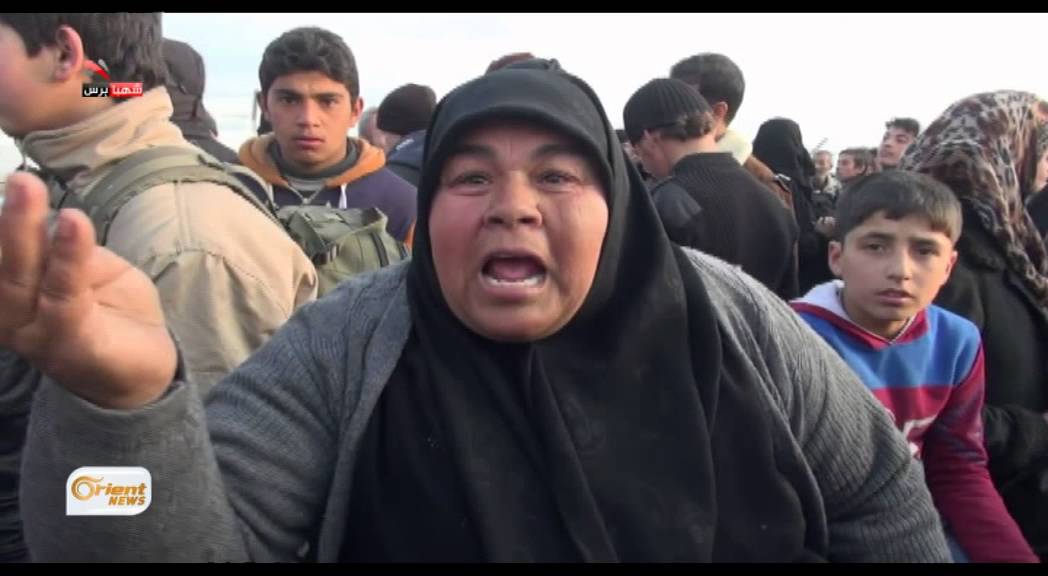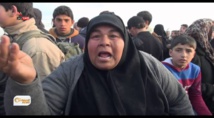A government offensive to retake all of Aleppo has pounded the city in recent days, with shelling of an opposition-controlled area reported to have killed at least 26 civilians.
Artillery shells rained down on one southeastern rebel-held district.
The motionless body of a girl lay crumpled in the street, her arm severed and her head pierced by shrapnel. Rescue volunteers carried her body away on a motorcycle.
Speaking to the special Security Council session by video-link from London, Stephen O'Brien, the UN humanitarian chief, appealed for action to stop the fighting.
"For the sake of humanity we call on -- we plead -- with the parties and those with influence to do everything in their power to protect civilians and enable access to the besieged part of eastern Aleppo before it becomes one giant graveyard," he said.
Civilians have poured out of the besieged rebel-held east, battered by air strikes and heavy artillery fire by the advancing forces of President Bashar al-Assad.
On a visit to Paris, a local council leader east Aleppo called Wednesday for safe passage for desperate civilians, warning the UN would be "signing the death warrant of 250,000 people" if it failed to act.
"Let the civilians leave, protect the civilians, put in place a safe corridor so they can leave," Brita Hagi Hassan said after meeting French Foreign Minister Jean-Marc Ayrault.
Government troops and allied fighters have seized around 40 percent of the rebel-held east of Aleppo since they began an operation to recapture all of the city just over a fortnight ago.
They now fully control the city's northeast and pressed their offensive Wednesday on Aleppo's southeastern edges, advancing in the Sheikh Saeed district, according to state media.
The loss of Aleppo would be the biggest blow for Syria's opposition since the conflict began in March 2011 with anti-government protests, before spiralling into a civil war.
- 'Barbaric offensive' -
The Syrian Observatory for Human Rights, a monitoring group, said Wednesday that more than 50,000 people have fled Aleppo's rebel-held districts, including at least 20,000 to government-held territory and another 30,000 to Kurdish-controlled districts.
Many others have travelled south into the remaining territory held by rebels.
Among them was Fawwaz al-Ashaari, 56, who left Sakhur district for a reception centre in government-held Jibrin, about 10 kilometres (six miles) north of Aleppo.
"I have lost my eldest son, my job, my house... The rest of my children only want to live in safety. They have seen death several times. I want them to know life," he said.
The UN has for months sought access to the east, but a plan it presented this month to deliver aid has yet to be approved by the government.
The Security Council session in New York was to later hear from the UN's peace envoy, Staffan de Mistura.
Syria's opposition National Coalition said it was working with France on a draft UN resolution seeking an immediate ceasefire in Aleppo, though regime ally Russia was likely to veto such a proposal.
Coalition head Anas al-Abdeh on Wednesday urged the UN to "take immediate, definitive steps to protect civilians in Aleppo and stop the barbaric offensive against them."
"This escalation is a war crime and a crime against humanity, another item on the Assad regime's long, bloody, barbaric list," Abdeh said.
A source close to Syria's rebel factions said opposition forces held talks as recently as Monday with Russian representatives in Ankara on a potential truce for Aleppo.
A member of Russia's general staff, General Sergei Rudskoi, said Wednesday that Moscow had not carried out any air strikes on east Aleppo for more than a month.
"Since October 18, in other words for the past 44 days, Russian planes have not flown over Aleppo", he said.
- 'Waiting for death' -
On Wednesday, at least 26 civilians including seven children were killed in government artillery fire on the Jubb al-Qubbeh district in east Aleppo, the Observatory said.
The White Helmets rescue group, which operates in rebel-held areas, published pictures of the attack's aftermath, showing an apocalyptic scene with bodies, pieces of flesh, and suitcases strewn across the street.
A young man wept next to two bodies, their top halves obscured by blankets. The feet of one body were clad in pink socks, the other wore red boots done up with white laces.
The Observatory says more than 300 civilians, including 33 children, have been killed in east Aleppo since the latest government assault began on November 15.
Another 48 civilians have been killed in west Aleppo, according to the monitor.
State news agency SANA said eight civilians including two children had been killed in rebel fire on several districts in the city's west on Wednesday.
-----------------------------------------------------------------------------------------------------------------
Artillery shells rained down on one southeastern rebel-held district.
The motionless body of a girl lay crumpled in the street, her arm severed and her head pierced by shrapnel. Rescue volunteers carried her body away on a motorcycle.
Speaking to the special Security Council session by video-link from London, Stephen O'Brien, the UN humanitarian chief, appealed for action to stop the fighting.
"For the sake of humanity we call on -- we plead -- with the parties and those with influence to do everything in their power to protect civilians and enable access to the besieged part of eastern Aleppo before it becomes one giant graveyard," he said.
Civilians have poured out of the besieged rebel-held east, battered by air strikes and heavy artillery fire by the advancing forces of President Bashar al-Assad.
On a visit to Paris, a local council leader east Aleppo called Wednesday for safe passage for desperate civilians, warning the UN would be "signing the death warrant of 250,000 people" if it failed to act.
"Let the civilians leave, protect the civilians, put in place a safe corridor so they can leave," Brita Hagi Hassan said after meeting French Foreign Minister Jean-Marc Ayrault.
Government troops and allied fighters have seized around 40 percent of the rebel-held east of Aleppo since they began an operation to recapture all of the city just over a fortnight ago.
They now fully control the city's northeast and pressed their offensive Wednesday on Aleppo's southeastern edges, advancing in the Sheikh Saeed district, according to state media.
The loss of Aleppo would be the biggest blow for Syria's opposition since the conflict began in March 2011 with anti-government protests, before spiralling into a civil war.
- 'Barbaric offensive' -
The Syrian Observatory for Human Rights, a monitoring group, said Wednesday that more than 50,000 people have fled Aleppo's rebel-held districts, including at least 20,000 to government-held territory and another 30,000 to Kurdish-controlled districts.
Many others have travelled south into the remaining territory held by rebels.
Among them was Fawwaz al-Ashaari, 56, who left Sakhur district for a reception centre in government-held Jibrin, about 10 kilometres (six miles) north of Aleppo.
"I have lost my eldest son, my job, my house... The rest of my children only want to live in safety. They have seen death several times. I want them to know life," he said.
The UN has for months sought access to the east, but a plan it presented this month to deliver aid has yet to be approved by the government.
The Security Council session in New York was to later hear from the UN's peace envoy, Staffan de Mistura.
Syria's opposition National Coalition said it was working with France on a draft UN resolution seeking an immediate ceasefire in Aleppo, though regime ally Russia was likely to veto such a proposal.
Coalition head Anas al-Abdeh on Wednesday urged the UN to "take immediate, definitive steps to protect civilians in Aleppo and stop the barbaric offensive against them."
"This escalation is a war crime and a crime against humanity, another item on the Assad regime's long, bloody, barbaric list," Abdeh said.
A source close to Syria's rebel factions said opposition forces held talks as recently as Monday with Russian representatives in Ankara on a potential truce for Aleppo.
A member of Russia's general staff, General Sergei Rudskoi, said Wednesday that Moscow had not carried out any air strikes on east Aleppo for more than a month.
"Since October 18, in other words for the past 44 days, Russian planes have not flown over Aleppo", he said.
- 'Waiting for death' -
On Wednesday, at least 26 civilians including seven children were killed in government artillery fire on the Jubb al-Qubbeh district in east Aleppo, the Observatory said.
The White Helmets rescue group, which operates in rebel-held areas, published pictures of the attack's aftermath, showing an apocalyptic scene with bodies, pieces of flesh, and suitcases strewn across the street.
A young man wept next to two bodies, their top halves obscured by blankets. The feet of one body were clad in pink socks, the other wore red boots done up with white laces.
The Observatory says more than 300 civilians, including 33 children, have been killed in east Aleppo since the latest government assault began on November 15.
Another 48 civilians have been killed in west Aleppo, according to the monitor.
State news agency SANA said eight civilians including two children had been killed in rebel fire on several districts in the city's west on Wednesday.
-----------------------------------------------------------------------------------------------------------------









 Home
Home Politics
Politics











